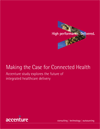
Accenture's Connected Health study combines deep research-interviews with more than 160 healthcare leaders, a survey among more than 3,700 doctors and clinicians, case studies, literature reviews and more - to provide a broad analysis of how health systems can accelerate progress and gain tangible benefits from their connected health initiatives.
Accenture's research shows that these countries all have a vision for connected health - though each is unique - and highlights the similarities and differences in their responses to the growing health crisis. To improve quality and access while trying to control costs, they are all moving, to some degree, toward integrated healthcare.
Download: Making the Case for Connected Health (.pdf, 4,818 KB).
Download from eHealthNews.eu Portal's mirror: Making the Case for Connected Health (.pdf, 4,818 KB).
For further information about the "Connected Health Study", please visit:
http://www.accenture.com/us-en/Pages/service-connected-health-study.aspx